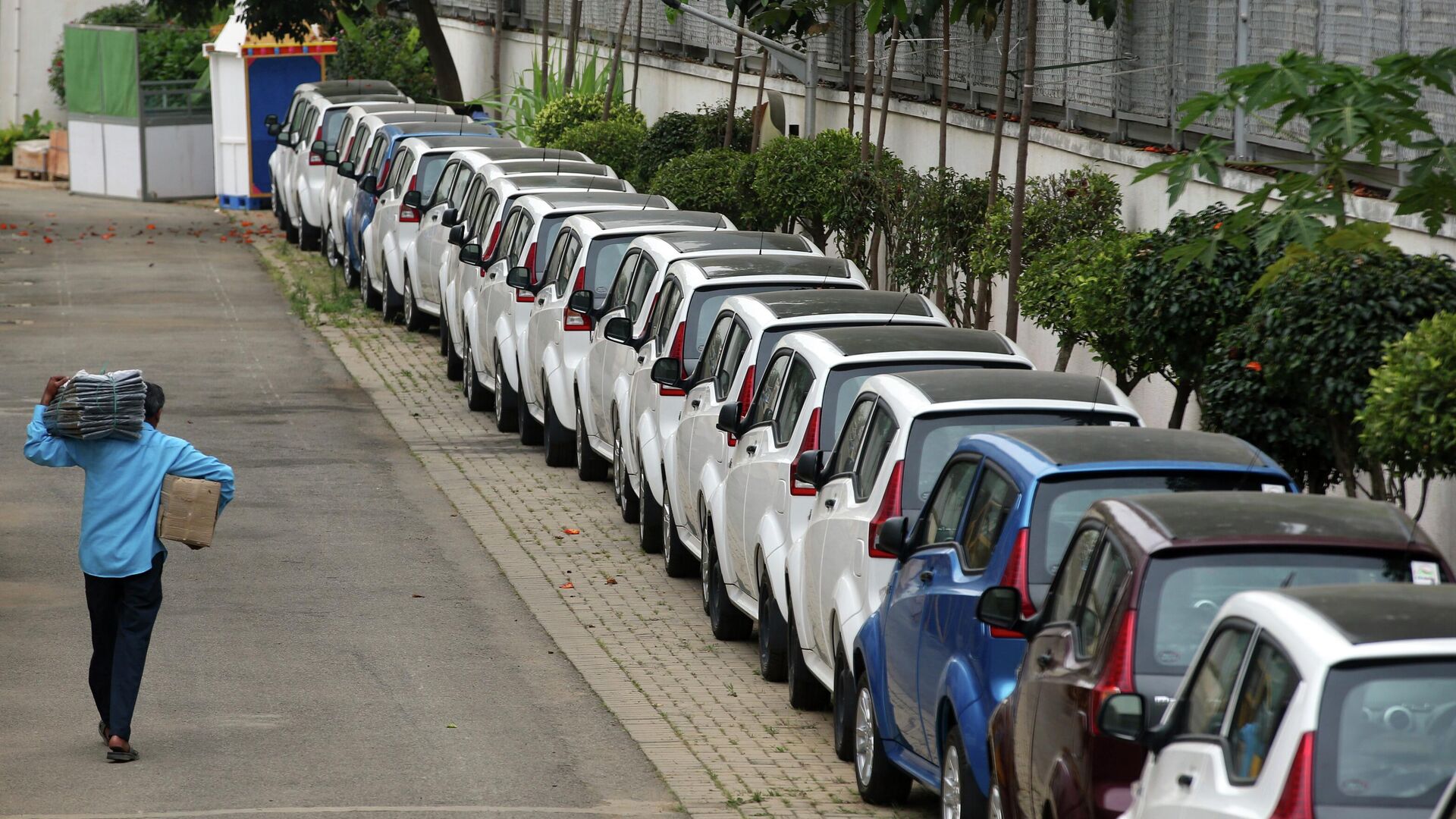https://sputnikglobe.com/20220712/incentives-for-charging-point-operators-can-stimulate-ev-industry-in-india-joulepoint-founder-says-1097228288.html
Incentives for Charging Point Operators Can Stimulate EV Industry in India, Joulepoint Founder Says
Incentives for Charging Point Operators Can Stimulate EV Industry in India, Joulepoint Founder Says
Sputnik International
The electric vehicle industry in India is at a nascent stage despite growing at a rapid pace. According to the Federation of Automobile Dealers Associations... 12.07.2022, Sputnik International
2022-07-12T12:44+0000
2022-07-12T12:44+0000
2022-07-19T10:44+0000
electric vehicles
electric vehicles
electric car
electric cars
electric bus
electric bike
electric car charging
https://cdn1.img.sputnikglobe.com/img/07e6/07/0c/1097232276_0:49:3130:1810_1920x0_80_0_0_9a67b3b069bffeb0107959258caf3ebd.jpg
Despite a major push towards electric vehicles in India, there are still a lot of roadblocks that are first required to be addressed. One of the major ones is the shortage of charging points.Joulepoint is the fastest growing operating system for EV charger management platforms in India. The company will be setting up 4,000-5,000 charging stations at 2,000 locations in the Delhi National Capital Region (NCR).In an interview with Sputnik, the founder of Joulepoint, Rajesh Kanakgiri, talked about the major challenges, ways to address them, and developments in EV infrastructure in India.Sputnik: What are the key challenges that the operators face in setting up charging points?Rajesh Kanakgiri: Charging point operators face several issues as of now. One of the most prominent challenges that we face is the availability of land at the required location.Somehow, if the charging point operators are able to find the land at the given location, they have to deal with the availability of power or electricity. For a charging point to be operational all the time, we need to ensure uninterrupted and consistent power supply. Loadshedding and power fluctuation are serious problems to the charging stations.Apart from this, the lengthy and time-consuming regulatory processes are other major challenges for us. Getting approval is an uphill task. The government should bring in single-window clearance for the charging point operators to provide an easy solution to this.Although there is a strong push from the government to promote the EV industry, there are practically no incentives from the government to those who want to set up charging stations.Lack of basic awareness to set up the charging stations is another major hindrance in the country. A lot of people have set up the charging points for e-rickshaw drivers, but no safety norms are being followed. Many incidents of fire have been reported at such places.Sputnik: What suggestions do you have for the government if it is to overcome these problems?Rajesh Kanakgiri: Charging stations are the nervous system of the EV industry and in order to set up the charging stations to provide uninterrupted power to the electric vehicles, it is important to ensure uninterrupted power supply.Apart from this, as I said earlier, the government should also focus on implementing a single-window approval system for the power connection to the charging stations. Users should be incentivized to set up charging stations, as without enough such stations, it is impossible to imagine a flourishing EV industry.The government should also run awareness campaigns regarding the incentives so that more and more people can come forward to set up charging stations.Sputnik: How feasible are the solutions to be implemented on ground? What has been the government's attitude towards welcoming the recommendations?Rajesh Kanakgiri: All of our recommendations are quite simple, straightforward, and easy to implement. Therefore, we believe there is no question of feasibility here.Besides, we request the government of India to implement all the recommendations by Abhijeet Sinha, president CPOS (Charge Point Operator society), director, NHEV (National Highway EV) director EOD (Ease of Doing Business), who is doing a commendable job in bridging the gap between the aspirations of the users and the expectations of the government.Sputnik: What is your take on the current pace of e-mobility in the country?Rajesh Kanakgiri: Joulepoint is pretty much satisfied with the current developments happening in e-mobility in the country.The government is firm on its commitment towards the promotion of the industry. Brainstorming is continuously happening in government circles on making the EV industry more efficient, user-friendly, and competitive.Encouraged by these developments, Joulepoint is committed to setting up 100,000 EV charging stations by 2030 and provide its contribution to India's National EV mission.Want to know more? Check out our Koo & Telegram accounts!Koo: https://www.kooapp.com/profile/sputniknewsSputnik India: https://t.me/sputniknewsindia
Sputnik International
feedback@sputniknews.com
+74956456601
MIA „Rossiya Segodnya“
2022
Rahul Trivedi
https://cdn1.img.sputnikglobe.com/img/07e5/05/12/1082926121_0:-1:627:627_100x100_80_0_0_d882e1a63f627c25b7a534fb8b8234d7.jpg
Rahul Trivedi
https://cdn1.img.sputnikglobe.com/img/07e5/05/12/1082926121_0:-1:627:627_100x100_80_0_0_d882e1a63f627c25b7a534fb8b8234d7.jpg
News
en_EN
Sputnik International
feedback@sputniknews.com
+74956456601
MIA „Rossiya Segodnya“
Sputnik International
feedback@sputniknews.com
+74956456601
MIA „Rossiya Segodnya“
Rahul Trivedi
https://cdn1.img.sputnikglobe.com/img/07e5/05/12/1082926121_0:-1:627:627_100x100_80_0_0_d882e1a63f627c25b7a534fb8b8234d7.jpg
electric vehicles, electric vehicles, electric car, electric cars, electric bus, electric bike, electric car charging
electric vehicles, electric vehicles, electric car, electric cars, electric bus, electric bike, electric car charging
Incentives for Charging Point Operators Can Stimulate EV Industry in India, Joulepoint Founder Says
12:44 GMT 12.07.2022 (Updated: 10:44 GMT 19.07.2022) The electric vehicle industry in India is at a nascent stage despite growing at a rapid pace. According to the Federation of Automobile Dealers Associations, retail sales of EVs hit their highest at 429,217 units in FY 2022, compared to 134,821 units in FY 2021 and 168,300 units in FY 2020.
Despite a
major push towards electric vehicles in India, there are still a lot of roadblocks that are first required to be addressed. One of the major ones is the shortage of charging points.
Joulepoint is the fastest growing operating system for EV charger management platforms in India. The company will be setting up 4,000-5,000 charging stations at 2,000 locations in the Delhi National Capital Region (NCR).
In an interview with Sputnik, the founder of Joulepoint, Rajesh Kanakgiri, talked about the major challenges, ways to address them, and developments in EV infrastructure in India.
Sputnik: What are the key challenges that the operators face in setting up charging points?
Rajesh Kanakgiri: Charging point operators face several issues as of now. One of the most prominent challenges that we face is the availability of land at the required location.
Somehow, if the charging point operators are able to find the land at the given location, they have to deal with the availability of power or electricity. For a charging point to be operational all the time, we need to ensure uninterrupted and consistent power supply. Loadshedding and power fluctuation are serious problems to the charging stations.
Apart from this, the lengthy and time-consuming regulatory processes are other major challenges for us. Getting approval is an uphill task. The government should bring in single-window clearance for the charging point operators to provide an easy solution to this.
Although there is a strong push from the government to promote the EV industry, there are practically no incentives from the government to those who want to set up charging stations.
Lack of basic awareness to set up the charging stations is another major hindrance in the country.
A lot of people have set up the charging points for e-rickshaw drivers, but no safety norms are being followed. Many incidents of fire have been
reported at such places.
Sputnik: What suggestions do you have for the government if it is to overcome these problems?
Rajesh Kanakgiri: Charging stations are the nervous system of the EV industry and in order to set up the charging stations to provide uninterrupted power to the electric vehicles, it is important to ensure uninterrupted power supply.
Apart from this, as I said earlier, the government should also focus on implementing a single-window approval system for the power connection to the charging stations. Users should be incentivized to set up charging stations, as without enough such stations, it is impossible to imagine a flourishing EV industry.
The government should also run awareness campaigns regarding the incentives so that more and more people can come forward to set up charging stations.
Sputnik: How feasible are the solutions to be implemented on ground? What has been the government's attitude towards welcoming the recommendations?
Rajesh Kanakgiri: All of our recommendations are quite simple, straightforward, and easy to implement. Therefore, we believe there is no question of feasibility here.
Besides, we request the government of India to implement all the recommendations by Abhijeet Sinha, president CPOS (Charge Point Operator society), director, NHEV (
National Highway EV) director EOD (Ease of Doing Business), who is doing a commendable job in bridging the gap between the aspirations of the users and the expectations of the government.
Sputnik: What is your take on the current pace of e-mobility in the country?
Rajesh Kanakgiri: Joulepoint is pretty much satisfied with the current developments happening in e-mobility in the country.
The government is firm on its commitment towards the promotion of the industry. Brainstorming is continuously happening in government circles on making the EV industry more efficient, user-friendly, and competitive.
Encouraged by these developments, Joulepoint is committed to setting up 100,000 EV charging stations by 2030 and provide its contribution to India's National EV mission.
Want to know more? Check out our Koo & Telegram accounts!


